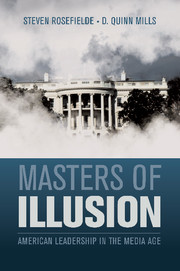Book contents
- Frontmatter
- Contents
- List of Tables and Figures
- Preface
- Acronyms
- Executive Summary
- Acknowledgments
- PART I NATIONAL SECURITY IN THE NEW AGE
- PART II AMERICAN PUBLIC CULTURE AND THE WORLD
- PART III AMERICAN PUBLIC CULTURE AND OURSELVES
- PART IV THE RECONFIGURATION OF NATIONAL WEALTH AND POWER
- PART V VORTEXES OF DANGER
- PART VI THE AMERICAN RESPONSE
- PART VII LEADING TOWARD PEACE
- PART VIII AMERICAN PRESIDENTIAL LEADERSHIP
- 18 How Public Culture Inhibits Presidential Leadership
- 19 Choosing a Great President
- 20 Master of Illusions
- Notes
- Glossary
- Bibliography
- Index
18 - How Public Culture Inhibits Presidential Leadership
Published online by Cambridge University Press: 31 July 2009
- Frontmatter
- Contents
- List of Tables and Figures
- Preface
- Acronyms
- Executive Summary
- Acknowledgments
- PART I NATIONAL SECURITY IN THE NEW AGE
- PART II AMERICAN PUBLIC CULTURE AND THE WORLD
- PART III AMERICAN PUBLIC CULTURE AND OURSELVES
- PART IV THE RECONFIGURATION OF NATIONAL WEALTH AND POWER
- PART V VORTEXES OF DANGER
- PART VI THE AMERICAN RESPONSE
- PART VII LEADING TOWARD PEACE
- PART VIII AMERICAN PRESIDENTIAL LEADERSHIP
- 18 How Public Culture Inhibits Presidential Leadership
- 19 Choosing a Great President
- 20 Master of Illusions
- Notes
- Glossary
- Bibliography
- Index
Summary
POOR CHOICES FOR PRESIDENT
Modern thought makes strong distinctions between three functions that we used to treat as one. Administration involves the application and enforcement of rules and procedures; management involves a focus on getting results accomplished and doing so in an efficient way; leadership involves energizing others via a vision of the future – it requires an objective comprehension of the situation, development of effective responses and the ability to persuasively inform the public about them. Administrators care little for getting things done (results) or for efficiency; managers require both results and efficiency in order to make profits, and are impatient with rules and procedures; leaders focus on broad directions and gathering the support of others, and care little for rules and procedures, or for daily results and efficiency. Modern societies, like modern corporations require all three functions. Few people are trained for more than one of the three functions, or are good at more than one.
Today, the United States invests little administrative responsibility in our president, administration is accomplished in specialized agencies. But managerial and leadership responsibilities are combined in the president's office. The president is responsible for the functioning and budget of much of the federal government – managerial responsibilities; and also for broad direction for our society and for the gathering of public support for major initiatives, including especially military conflicts – leadership responsibilities.
- Type
- Chapter
- Information
- Masters of IllusionAmerican Leadership in the Media Age, pp. 405 - 435Publisher: Cambridge University PressPrint publication year: 2006

